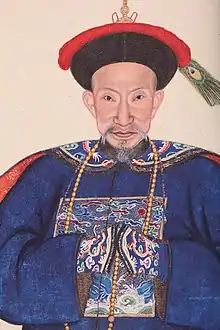Sun Shiyi | |
|---|---|
 | |
| Grand Councillor | |
| In office 1789–1789 | |
| Grand Secretary of the Wenyuan Library | |
| In office 1792–1796 | |
| Assistant Grand Secretary | |
| In office 1791–1792 | |
| Viceroy of Sichuan | |
| In office 1795 – 1796 (acting) | |
| Preceded by | Helin |
| Succeeded by | Funing |
| In office 1789–1790 | |
| Preceded by | Li Shijie |
| Succeeded by | Booning (acting) |
| Minister of Personnel | |
| In office 1791–1792 | |
| Preceded by | Peng Yuanrui |
| Succeeded by | Liu Yong |
| Viceroy of Liangjiang | |
| In office 1790–1791 | |
| Preceded by | Fusong |
| Succeeded by | Changlin |
| Minister of War | |
| In office 1789–1790 Serving with Qinggui | |
| Preceded by | Peng Yuanrui |
| Succeeded by | Li Shijie |
| Viceroy of Liangguang | |
| In office 1786–1789 | |
| Preceded by | Fulehun |
| Succeeded by | Fuk'anggan |
| In office 1785–1786 | |
| Preceded by | Shuchang |
| Succeeded by | Fulehun |
| Personal details | |
| Born | 1720 Hangzhou, Zhejiang |
| Died | 1796 (aged 75–76) Laifeng County, Hubei |
Sun Shiyi (simplified Chinese: 孙士毅; traditional Chinese: 孫士毅; pinyin: Sūn Shìyì; Wade–Giles: Sun Shih-i, Vietnamese: Tôn Sĩ Nghị; 1720 – 1796), courtesy name Zhizhi (智冶), pseudonym Bushan (補山), was an official of the Qing dynasty who served as the Viceroy of Liangguang[1] and of Liangjiang during the reign of the Qianlong Emperor.[2]
A native of Renhe (present-day Yuhang District, Zhejiang), as a youth, Sun was devoted to study and was said to have prevented drowsiness by knocking his head against a wall. Awarded a jinshi degree in the imperial examination in 1761, he was secretary to Fuheng during his Burmese expedition, and in 1770 had risen to be Treasurer of Guangxi, when he was cashiered for want of energy, and orders were given to confiscate his property. Struck with the fact that nothing was found to confiscate, the Qianlong Emperor re-employed him.
In 1788, as Viceroy of Liangguang, he invaded Annam and reinstalled the emperor Lê Chiêu Thống, who had fled in fear of the rebel Nguyễn Huệ. His forces were beaten by the Tây Sơn armies, and it was ultimately decided to leave Annam alone. He was sent to Sichuan to see the supplies of the army fighting in Tibet, into which country he advanced over terrible mountains as far as Chamdo. In 1792, on the conclusion of the war with Nepal, the suppression of the White Lotus Rebellion occupied his last days. His physical powers were marvellous, and he required hardly any sleep. He was a great collector of ancient inscriptions. He was ennobled as Duke Mouyong of the First Class (一等謀勇公).[3]
References
- ↑ Ownby, David (1996). Brotherhoods and secret societies in early and mid-Qing China: the formation of a tradition. Stanford University Press. pp. 111–113. ISBN 978-0-8047-2651-1.
- ↑ Truhart, Peter (2000). Regents of nations: systematic chronology of states and their political representatives in past and present : a biographical reference book, Volume 3. K. G. Saur. ISBN 978-3-598-21545-2.
- ↑ Herbert Allen Giles, A Chinese Biographical Dictionary, p. 694. (1898).
Further reading
- Iona Man-Cheong (2004). The class of 1761: examinations, state, and elites in eighteenth-century China. Stanford University Press. pp. 180–200. ISBN 978-0-8047-4146-0.
- Hummel, Arthur W. Sr., ed. (1943). . Eminent Chinese of the Ch'ing Period. United States Government Printing Office.